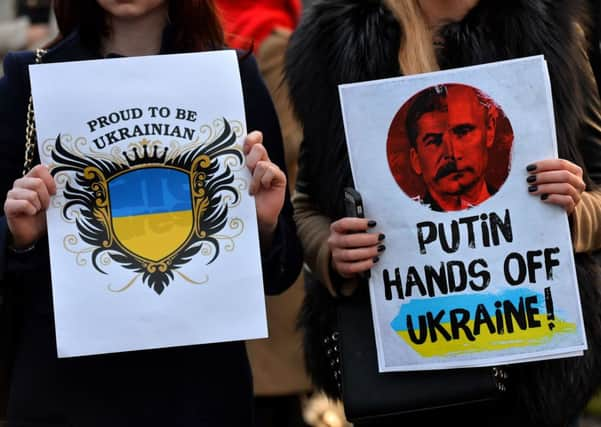Leaders: Ukraine crisis | Economic uncertainty


The ultimatum was subsequently denied by the Russian defence ministry.
Russian military spokespeople claimed this was but one of a number of provocations, by whom is not entirely clear, intended to push Russian forces in Crimea into a head-on confrontation, meaning a shooting conflict. More likely, it is a Russian manoeuvre which sends a blunt message – we are here to stay in Crimea and calls for us to depart are so much wasted breath.
Advertisement
Hide AdAdvertisement
Hide AdThe importance of Crimea to Russia is hard to overstate. It contains Russia’s main Black Sea naval base. Without it, access to the Mediterranean becomes a lot harder and Russia’s underbelly looks a lot more vulnerable. Russia is not going to give up Crimea under almost any circumstances. And indeed, while Europe and the United States might want Russia to relinquish its Crimean stranglehold, it is hard to see what leverage the west has. Vladimir Putin can claim to be protecting his citizens against what is, at best, a chaotic state where law does not rule or, at worst, a state that is hostile and threatening to its people.
The diplomatic efforts that the West must surely now intensify may well have to recognise this. There is no conceivable military action that can be taken in response. The hard fact is that Russia, while a major part of the problem, also has to be part of the solution.
No lasting normalisation of life in Ukraine is possible unless Russia is part of the process so, unpalatable though it may be both in Kiev and elsewhere, a stepped-up Russian military presence in Crimea may just have to be accepted.
But before such a normalisation can begin, the sabres have to be sheathed and the military manoeuvring ended. This is not something that can be achieved overnight.
Both Kiev and Moscow have to issue, and be seen loudly and clearly to issue, orders that all the units under their command are neither to attack nor to provoke an attack.
There is also a severe risk that with ethnic and national tensions already inflamed, with the rule of law so tattered, and with police forces so widely distrusted, that civilian groups may start attacking each other. Some sort of calm has to be urgently restored.
Western diplomacy can play a role in this. Mr Putin can be threatened with diplomatic and economic isolation, but also offered carrots – the money that Ukraine needs to function and to repay its debts to Russia.
The task is horrendously hard, and it is now overshadowed by the possibility that one shot fired by mistake in the small hours of the morning risks provoking a major conflict.
Women seek economic certainty
Advertisement
Hide AdAdvertisement
Hide AdWomen are less likely than men to favour independence. This has long been the case and neither promoting Nicola Sturgeon to be the face of the Yes campaign nor promising that independence would enable the implementation of women-friendly policies such as extended child care have done much to change that.
In admitting this, Ms Sturgeon has acknowledged that getting the Yes campaign into a winning position is proving hard. It used to be thought that Alex Salmond’s macho aggression was the problem here. If so, Ms Sturgeon has done a fair job, especially in recent television debate appearances, of imitating the First Minister’s belligerence. A stiller, calmer voice of reason rather than trying to be the one with the biggest decibel count might help.
The problem for the SNP, however, may be more fundamental than that. Most probably, the reason why more women than men are troubled by the prospect of independence is the question of economic uncertainty.
A higher proportion of women than men are economically dependent. They are more likely than men to be at home, looking after the children, and dependent on their spouse’s income. They are also more likely to be single parents, and amongst the elderly, more are female and dependent on a pension income.
That lack of economic independence is regrettable but is nonetheless a fact of life, and people who are dependent are much more likely to worry about economic uncertainty than those who can find another income.
Attracting more women means proving there is more economic certainty with independence than without it, which is the central problem of the Yes campaign.